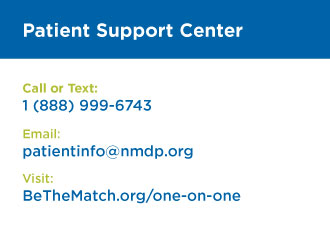If you are a transplant recipient, please share this article with your caregivers.
Researchers know that transplant caregivers are affected physically, emotionally, socially and spiritually by the transplant process and recovery. But caregivers may be thinking about all they have to do, and not thinking of taking care of themselves. In this article, you’ll find tips to help cope with the many challenges that come with taking care of a loved one who is recovering from a transplant. Plus, Be The Match has many free resources, listed at the bottom of this article, that can help.
Coping with stress
The stress of recovery from transplant affects you, too. And if you become physically exhausted or emotionally overwhelmed, you won’t be able to provide the care you want to give your loved one in the months ahead.
People have different styles of coping with stress. Think about your coping techniques and how they are, or aren’t, helping you. You can do this on your own, but some caregivers find it helpful to get support from others, including professional counselors, to help them learn coping techniques that work best for them.
Here are a few things to remember to help you cope when you feel stressed:
- It’s normal to have emotional ups and downs
- Put first things first and let the little things go
- It’s okay to take some time alone
- There are people who can help
- You do many things very well
- Take a breath in and out
Coping with emotions
Care giving can bring up a lot of different emotions. And some of them, like anger or guilt, might at first seem wrong, and cause a caregiver to feel ashamed. But it’s important for you to know that all of your emotions are normal and okay. It’s how you cope with them that matters.
Here are some common emotions that caregivers sometimes experience, and some tips on handling them:
- Feeling sad is normal. But if it lasts for more than 2 weeks, and interferes with your daily life, tell your doctor. It could be depression.
If you’re angry, do some self-reflection to figure out why. Knowing the cause might help you think of ways to cope. - Transplant has brought about a big change in your life, and it’s okay to grieve the loss of the way things were before. Grief takes time and attention to work through, and professional counseling may help you through the process.
- No matter how dedicated you are, you might feel guilty that you’re not able to do more. Or, you might even feel guilty if you focus on your own needs. Remember, nobody is perfect and you do many things well. Caring for yourself is as important as caring for your loved one.
- You might feel alone if friends and family have stopped visiting, or if you think no one understands your situation. Sharing your feelings with someone you trust may help you feel less lonely.
You have your own path to recovery
Because you are focusing so much on your loved one, you might not notice your own stress.
It’s important for you to pay attention to your own health and well-being because severe or chronic stress can cause depression, problems with memory and concentration, tiredness, and other issues if left untreated.
One caregiver put it this way: “I wasn’t really interested in any of the things I used to do. I was so busy trying to make it through each day that I never noticed that I had changed. My doctor explained that I was depressed and overwhelmed ─ and he prescribed anti-depression medicine (which helped). Both my daughters said they were happy to hear me laugh again.”
Sometimes it can help to talk with someone who’s been where you are and gets it. The Be The Match Peer Connect program connects you with a trained volunteer who is also a transplant caregiver. These volunteers can answer your questions and share their own experiences. Visit the website to learn more and request a Peer Connect connection.
Getting help from others
Everyone needs support when they are going through a difficult time. It’s okay to ask for and accept help. Remember, you would want to help your family and friends if they were in your situation.
Reach out to family and friends and let them know that you still need their help once you’ve left the hospital and returned home. General requests such as “Could you watch the kids sometime?” likely won’t help. Instead, ask for something specific such as “Next week we have several appointments. Could you watch the kids next Friday afternoon from 2 to 4?” If you don’t live close to family or friends, consider asking neighbors, faith community members or co-workers for support.
Also, keep a list of specific tasks you need help with, like:
- Meals
- Childcare
- Transportation
- Yard work
- Housework
- Grocery shopping
Post the list in your home where people can see it, but more important, share it with friends, family, coworkers, or any other potential source of support. If you use social media or other online support forums, such as Caring Bridge, consider making requests for help there.
Support for caregivers at every step
Remember, you’re not alone. Help is available. Contact the BMT Patient Navigators through the Be The Match Patient Support Center. They can help you get reliable, easy-to-understand information from diagnosis through recovery. They can also help you access one-on-one support through our:
- Caregiver and Parent’s Companion Programs
- Counseling services
- Peer Connect Program
Call or email us to learn about the many other ways we can support you through confidential, one-on-one support from caring experts. We’ll listen and help you find answers. All of our programs and resources are free.
CALL: 1 (888) 999-6743 Monday through Friday, 8 a.m. – 5 p.m. Central Time
EMAIL: patientinfo@nmdp.org
LEARN MORE: BeTheMatch.org/patient
ORDER RESOURCE MATERIALS: BeTheMatch.org/request

